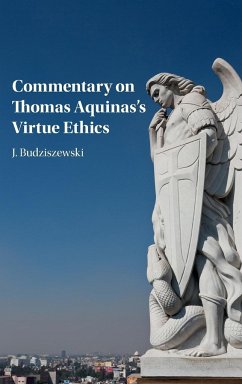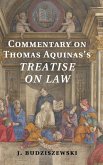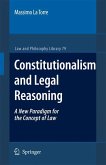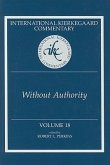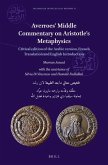J. Budziszewski
Commentary on Thomas Aquinas's Virtue Ethics
J. Budziszewski
Commentary on Thomas Aquinas's Virtue Ethics
- Gebundenes Buch
- Merkliste
- Auf die Merkliste
- Bewerten Bewerten
- Teilen
- Produkt teilen
- Produkterinnerung
- Produkterinnerung
This guide to St Thomas Aquinas' virtue ethics provides commentary on essential texts, rendering them accessible to all readers.
Andere Kunden interessierten sich auch für
![Commentary on Thomas Aquinas's Treatise on Law Commentary on Thomas Aquinas's Treatise on Law]() J. BudziszewskiCommentary on Thomas Aquinas's Treatise on Law116,99 €
J. BudziszewskiCommentary on Thomas Aquinas's Treatise on Law116,99 €![Commentary on Thomas Aquinas's Treatise on Happiness and Ultimate Purpose Commentary on Thomas Aquinas's Treatise on Happiness and Ultimate Purpose]() J. BudziszewskiCommentary on Thomas Aquinas's Treatise on Happiness and Ultimate Purpose168,99 €
J. BudziszewskiCommentary on Thomas Aquinas's Treatise on Happiness and Ultimate Purpose168,99 €![The Ethics of Assistance The Ethics of Assistance]() Deen K. Chatterjee (ed.)The Ethics of Assistance88,99 €
Deen K. Chatterjee (ed.)The Ethics of Assistance88,99 €![Constitutionalism and Legal Reasoning Constitutionalism and Legal Reasoning]() Massimo La TorreConstitutionalism and Legal Reasoning112,99 €
Massimo La TorreConstitutionalism and Legal Reasoning112,99 €![International Kierkegaard Commentary Volume 18 International Kierkegaard Commentary Volume 18]() Robert L PerkinsInternational Kierkegaard Commentary Volume 1853,99 €
Robert L PerkinsInternational Kierkegaard Commentary Volume 1853,99 €![Averroes' Middle Commentary on Aristotle's Metaphysics Averroes' Middle Commentary on Aristotle's Metaphysics]() Averroes' Middle Commentary on Aristotle's Metaphysics175,99 €
Averroes' Middle Commentary on Aristotle's Metaphysics175,99 €![Global Financial Crisis: The Ethical Issues Global Financial Crisis: The Ethical Issues]() Global Financial Crisis: The Ethical Issues38,99 €
Global Financial Crisis: The Ethical Issues38,99 €-
-
-
This guide to St Thomas Aquinas' virtue ethics provides commentary on essential texts, rendering them accessible to all readers.
Hinweis: Dieser Artikel kann nur an eine deutsche Lieferadresse ausgeliefert werden.
Hinweis: Dieser Artikel kann nur an eine deutsche Lieferadresse ausgeliefert werden.
Produktdetails
- Produktdetails
- Verlag: Cambridge University Press
- Seitenzahl: 324
- Erscheinungstermin: 5. April 2017
- Englisch
- Abmessung: 235mm x 157mm x 24mm
- Gewicht: 678g
- ISBN-13: 9781107165786
- ISBN-10: 1107165784
- Artikelnr.: 48208361
- Herstellerkennzeichnung
- Libri GmbH
- Europaallee 1
- 36244 Bad Hersfeld
- gpsr@libri.de
- Verlag: Cambridge University Press
- Seitenzahl: 324
- Erscheinungstermin: 5. April 2017
- Englisch
- Abmessung: 235mm x 157mm x 24mm
- Gewicht: 678g
- ISBN-13: 9781107165786
- ISBN-10: 1107165784
- Artikelnr.: 48208361
- Herstellerkennzeichnung
- Libri GmbH
- Europaallee 1
- 36244 Bad Hersfeld
- gpsr@libri.de
J. Budziszewski is a professor of government and philosophy at the University of Texas, Austin, where he also teaches courses in religious studies and in the law school. His work includes numerous books as well as a blog, The Underground Thomist. Budziszewski thinks and writes chiefly about classical natural law, conscience and self-deception, moral character, family and sexuality, religion and public life, authentic versus counterfeit toleration and liberty, and the state of our common culture.
Acknowledgments; Ante Studium; Introduction; Part I. Moral Character in General: Commentary on I-II
Question 55
Article 4: whether virtue is suitably defined?; Commentary on I-II
Question 58
Article 4: whether there can be moral without intellectual virtue?; Commentary on I-II
Question 58
Article 5: whether there can be intellectual without moral virtue?; Commentary on I-II
Question 61
Article 2: whether there are four cardinal virtues?; Commentary on I-II
Question 61
Article 3: whether any other virtues should be called principal rather than these?; Commentary on I-II
Question 62
Article 1: whether there are any theological virtues?; Commentary on I-II
Question 63
Article 1: whether virtue is in us by nature?; Commentary on I-II
Question 63
Article 2: whether any virtue is caused in us by habituation?; Commentary on I-II
Question 65
Article 1: whether the moral virtues are connected with each other?; Commentary on I-II
Question 84
Article 4: whether the seven capital vices are suitably reckoned?; Part II. The Virtue of Justice
Especially in Relation to Law: Commentary on II-II
Question 30
Article 3: whether mercy is a virtue?; Commentary on II-II
Question 58
Article 1: whether justice is fittingly defined as being the perpetual and constant will to render to each one his right?; Commentary on II-II
Question 60
Article 1: whether judgment is an act of justice?; Commentary on II-II
Question 60
Article 2: whether it is lawful to judge?; Commentary on II-II
Question 60
Article 5: whether we should always judge according to the written law?; Commentary on II-II
Question 60
Article 6: whether judgment is rendered perverse by being usurped?; Commentary on II-II
Question 80
Article 1: whether the virtues annexed to justice are suitably enumerated?; Commentary on II-II
Question 122
Article 1: whether the precepts of the Decalogue are precepts of justice?; Index.
Question 55
Article 4: whether virtue is suitably defined?; Commentary on I-II
Question 58
Article 4: whether there can be moral without intellectual virtue?; Commentary on I-II
Question 58
Article 5: whether there can be intellectual without moral virtue?; Commentary on I-II
Question 61
Article 2: whether there are four cardinal virtues?; Commentary on I-II
Question 61
Article 3: whether any other virtues should be called principal rather than these?; Commentary on I-II
Question 62
Article 1: whether there are any theological virtues?; Commentary on I-II
Question 63
Article 1: whether virtue is in us by nature?; Commentary on I-II
Question 63
Article 2: whether any virtue is caused in us by habituation?; Commentary on I-II
Question 65
Article 1: whether the moral virtues are connected with each other?; Commentary on I-II
Question 84
Article 4: whether the seven capital vices are suitably reckoned?; Part II. The Virtue of Justice
Especially in Relation to Law: Commentary on II-II
Question 30
Article 3: whether mercy is a virtue?; Commentary on II-II
Question 58
Article 1: whether justice is fittingly defined as being the perpetual and constant will to render to each one his right?; Commentary on II-II
Question 60
Article 1: whether judgment is an act of justice?; Commentary on II-II
Question 60
Article 2: whether it is lawful to judge?; Commentary on II-II
Question 60
Article 5: whether we should always judge according to the written law?; Commentary on II-II
Question 60
Article 6: whether judgment is rendered perverse by being usurped?; Commentary on II-II
Question 80
Article 1: whether the virtues annexed to justice are suitably enumerated?; Commentary on II-II
Question 122
Article 1: whether the precepts of the Decalogue are precepts of justice?; Index.
Acknowledgments; Ante Studium; Introduction; Part I. Moral Character in General: Commentary on I-II
Question 55
Article 4: whether virtue is suitably defined?; Commentary on I-II
Question 58
Article 4: whether there can be moral without intellectual virtue?; Commentary on I-II
Question 58
Article 5: whether there can be intellectual without moral virtue?; Commentary on I-II
Question 61
Article 2: whether there are four cardinal virtues?; Commentary on I-II
Question 61
Article 3: whether any other virtues should be called principal rather than these?; Commentary on I-II
Question 62
Article 1: whether there are any theological virtues?; Commentary on I-II
Question 63
Article 1: whether virtue is in us by nature?; Commentary on I-II
Question 63
Article 2: whether any virtue is caused in us by habituation?; Commentary on I-II
Question 65
Article 1: whether the moral virtues are connected with each other?; Commentary on I-II
Question 84
Article 4: whether the seven capital vices are suitably reckoned?; Part II. The Virtue of Justice
Especially in Relation to Law: Commentary on II-II
Question 30
Article 3: whether mercy is a virtue?; Commentary on II-II
Question 58
Article 1: whether justice is fittingly defined as being the perpetual and constant will to render to each one his right?; Commentary on II-II
Question 60
Article 1: whether judgment is an act of justice?; Commentary on II-II
Question 60
Article 2: whether it is lawful to judge?; Commentary on II-II
Question 60
Article 5: whether we should always judge according to the written law?; Commentary on II-II
Question 60
Article 6: whether judgment is rendered perverse by being usurped?; Commentary on II-II
Question 80
Article 1: whether the virtues annexed to justice are suitably enumerated?; Commentary on II-II
Question 122
Article 1: whether the precepts of the Decalogue are precepts of justice?; Index.
Question 55
Article 4: whether virtue is suitably defined?; Commentary on I-II
Question 58
Article 4: whether there can be moral without intellectual virtue?; Commentary on I-II
Question 58
Article 5: whether there can be intellectual without moral virtue?; Commentary on I-II
Question 61
Article 2: whether there are four cardinal virtues?; Commentary on I-II
Question 61
Article 3: whether any other virtues should be called principal rather than these?; Commentary on I-II
Question 62
Article 1: whether there are any theological virtues?; Commentary on I-II
Question 63
Article 1: whether virtue is in us by nature?; Commentary on I-II
Question 63
Article 2: whether any virtue is caused in us by habituation?; Commentary on I-II
Question 65
Article 1: whether the moral virtues are connected with each other?; Commentary on I-II
Question 84
Article 4: whether the seven capital vices are suitably reckoned?; Part II. The Virtue of Justice
Especially in Relation to Law: Commentary on II-II
Question 30
Article 3: whether mercy is a virtue?; Commentary on II-II
Question 58
Article 1: whether justice is fittingly defined as being the perpetual and constant will to render to each one his right?; Commentary on II-II
Question 60
Article 1: whether judgment is an act of justice?; Commentary on II-II
Question 60
Article 2: whether it is lawful to judge?; Commentary on II-II
Question 60
Article 5: whether we should always judge according to the written law?; Commentary on II-II
Question 60
Article 6: whether judgment is rendered perverse by being usurped?; Commentary on II-II
Question 80
Article 1: whether the virtues annexed to justice are suitably enumerated?; Commentary on II-II
Question 122
Article 1: whether the precepts of the Decalogue are precepts of justice?; Index.

